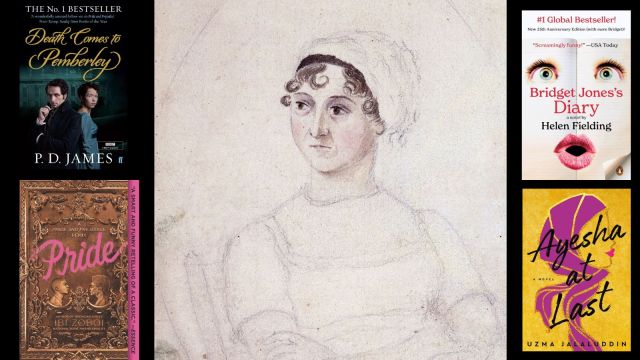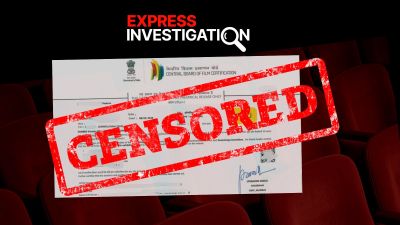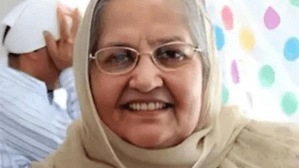Austen but not Austen: 8 brilliant retellings of Pride and Prejudice for modern Janeites
This year marks the 250th anniversary of Jane Austen’s birth. If you have already devoured her complete works and then some, and still find yourself yearning for more, here are seven modern novels inspired by her work to add to your reading list.
 At the heart of the novel are two characters who misjudge each other — publicly, spectacularly — and with consequences. (Wikimedia Comms and amazon.in)
At the heart of the novel are two characters who misjudge each other — publicly, spectacularly — and with consequences. (Wikimedia Comms and amazon.in)This year marks the 250th anniversary of Jane Austen’s birth, and the literary world is celebrating how it knows best: with festivals in her honour, renewed readings of her six iconic novels, and enthusiastic rewatching of their many screen adaptations. Adding to the festivities, book communities across social media are embracing Jane Austen July, an annual online event dedicated to exploring Austen’s novels, adaptations, biographies, and works inspired by her.
Though Austen passed away in 1817 at the age of 41, her influence only continues to increase year after year. Her trademark wit and social commentary continue to captivate readers – young and old, while modern authors draw inspiration from her to craft contemporary fiction, fantasy, romance, and mystery.
If you have already devoured her complete works and then some, and still find yourself yearning for more, here are seven modern novels inspired by Jane Austen to add to your reading list.
Death Comes to Pemberley by PD James
 The British Society of Eighteenth Century Studies called the BBC’s television series Death Comes to Pemberley a successful adaptation of a not so successful novel. (Source: The British Society of Eighteenth Century Studies)
The British Society of Eighteenth Century Studies called the BBC’s television series Death Comes to Pemberley a successful adaptation of a not so successful novel. (Source: The British Society of Eighteenth Century Studies)
If you thought the majestic Pemberley could be the perfect setting for either a gothic novel or a crime procedural, you are not alone. Mystery legend P D James reimagines what happens after the happy couple finally unites. Do they get a happily ever after or do they find themselves to be as compatible as oil and water after the first few years of marriage? In his version of Austen’s arguably most famous novel, set six years after Pride and Prejudice, the Darcys’ domestic peace destroyed when a corpse is found in Pemberley’s woods. The prime suspect, of course, is the caddish George Wickham, who once courted Elizabeth but later eloped with her younger sister, Lydia. James recreates Austen’s world while injecting Gothic tension and atmosphere. As Elizabeth and Darcy are interrogated, piece-by-piece a fuller picture of their married life emerges. A must-read for fans who want their Austen with a side of suspense. The book has adapted into a three-part British television drama.
Pride by Ibi Zoboi
 This remix of Austen’s Pride and Prejudice, drops the Bennets into modern Bushwick in Brooklyn, USA. (Source: amazon.in)
This remix of Austen’s Pride and Prejudice, drops the Bennets into modern Bushwick in Brooklyn, USA. (Source: amazon.in)
This remix of Austen’s Pride and Prejudice, drops the Bennets into modern Bushwick in Brooklyn, USA, where poet Zuri Benitez watches her rapidly gentrifying neighborhood with equal parts pride and panic. When the wealthy Darcy family moves in across the street, Zuri’s clashes with Darius Darcy crackle with cultural tension. The novel is a love letter not just to Austen, but to Black girlhood. As with the other works, the book is peppered with clever parallels, the Netherfield ball becomes a block party and Mr Collins is a condescending college student. The audiobook, narrated by poet Elizabeth Acevedo, adds another layer of brilliance. As per reports, Netflix is planning to adapt this 2018 retelling into a movie.
Bridget Jones’s Diary by Helen Fielding
 The novel captures the spirit of Pride and Prejudice, while being wholly original. (Source: Penguin)
The novel captures the spirit of Pride and Prejudice, while being wholly original. (Source: Penguin)
Have you ever thought what direction Elizabeth Bennet’s life would take, had she been born in the modern-day rather than Regency England? Fielding paints quite the picture. Her version of Lizzie Bennet in this hilarious 1990s update is a young lady who smokes like a chimney, drinks like a fish, and obsesses over her weight. She introduces Austen’s social satire to the chaotic world of London singletonhood, where answering machines and bad dates replace balls and entailments. remains the stuffy-but-dreamy romantic foil, while Daniel Cleaver channels Wickham’s charm with a dash of caddishness. The novel captures the spirit of Pride and Prejudice, while being wholly original. Bridget’s disastrous dinner parties and workplace humiliations are as cringe-worthy as they are relatable.
Ayesha at Last by Uzma Jalaluddin
 This is Pride and Prejudice reimagined with a sprinkling of mosque politics and hijabi fashion. (Source: amazon.in)
This is Pride and Prejudice reimagined with a sprinkling of mosque politics and hijabi fashion. (Source: amazon.in)
In this retelling of Pride and Prejudice, Jalaluddin uses Austen’s framework to examine contemporary issues such as Islamophobia and workplace discrimination. Set in Toronto’s Muslim community, this retelling follows aspiring poet Ayesha, who puts her dreams on hold to pay family debts. When she meets Khalid, devout, judgmental, and yet compelling, sparks fly a la Elizabeth and Darcy. This is Pride and Prejudice reimagined with a sprinkling of mosque politics and hijabi fashion. Jalaluddin balances romantic tension with explorations of faith, familial duty, and the immigrant experience. However, Khalid’s overbearing mother puts Mrs Bennet to shame, while Ayesha’s outspoken friend Hafsa makes Lydia look tame.
Austenland by Shannon Hale
 Protagonist Jane Hayes is gifted a vacation at Pembrook Park, an immersive Regency experience. (Source: amazon.in; and rotten tomatoes)
Protagonist Jane Hayes is gifted a vacation at Pembrook Park, an immersive Regency experience. (Source: amazon.in; and rotten tomatoes)
For any fan who has ever fantasised about living in an Austen novel, this charming meta-romance serves as both wish fulfillment and cautionary tale. Protagonist Jane Hayes is gifted a vacation at Pembrook Park, an immersive Regency experience where guests wear corsets, sip tea, and maybe find love with actor “suitors.” Hale satirises Austen fandom (spoiler: keep an eye out for a Colin Firth shrine) while delivering genuine romantic tension with the resort’s mysterious gardener. The 2013 film adaptation (with Keri Russell and JJ Feild) captures the book’s spirit, but the novel offers richer character development and a more satisfying romantic payoff.
Eligible by Curtis Sittenfeld
 In this retelling of Pride and Prejudice, Fitzwilliam Darcy plays the role of a neurosurgeon
In this retelling of Pride and Prejudice, Fitzwilliam Darcy plays the role of a neurosurgeon
The Bennets are transplanted to modern Cincinnati, where Liz is a magazine writer. Her pregnant sister Lydia is involved in reality TV, her father is in the middle of a health crisis, and the neurosurgeon is none other than Fitzwilliam Darcy. The satire bites hardest in its take on marriage-obsessed Mrs. Bennet (“Girls, don’t end up like the Kardashians!”) and Silicon Valley bro Chip Bingley. What makes Eligible stand out is how it reworks familiar scenes: the infamous proposal happens during a disastrous spin class, while Lydia’s scandal plays out on a Bachelor-esque show. Sittenfeld is unafraid to make bold changes (Mary Bennet becomes a cross-fit fanatic, Kitty is a lesbian), but keeps Austen’s core message.
Unmarriageable by Soniah Kamal
 The novel explores women’s agency in contemporary South Asian society, from the pressure to marry to the consequences of refusing. (Source: amazon.in)
The novel explores women’s agency in contemporary South Asian society, from the pressure to marry to the consequences of refusing. (Source: amazon.in)
Set in modern Pakistan, this retelling follows English teacher Alys Binat, whose refusal to conform to societal expectations makes her the black sheep of her family. When she meets Valentine Darsee, arrogant, wealthy, and frustratingly attractive , at a wedding, their verbal sparring matches Elizabeth and Darcy’s best. Kamal’s version shines in its cultural specificity: the Netherfield ball becomes a three-day Pakistani wedding extravaganza, while Mr Collins is reimagined as a condescending British-Pakistani doctor. The novel explores women’s agency in contemporary South Asian society, from the pressure to marry to the consequences of refusing. Kamal’s prose sparkles with wit – “It is a truth universally acknowledged that a mother with five unmarried daughters is in want of Valium”).
Heartstone by Elle Katharine White
 In this fantasy retelling, Aliza (Elizabeth) initially loathes dragonrider Alastair (Darcy). (Source: amazon.in)
In this fantasy retelling, Aliza (Elizabeth) initially loathes dragonrider Alastair (Darcy). (Source: amazon.in)
This young adult novel merges Game of Thrones with Austen’s Regency-era society. In this fantasy retelling, Aliza (Elizabeth) initially loathes dragonrider Alastair (Darcy), but these enemies fall in love as they clash with dragons, hobgoblins, a horde of monstrous creatures threaten the kingdom. To offset the threat, the Bennet sisters are training to be dragon riders. In this parallel dimension, gossip happens at dragon races, not balls, and “marriage contracts” involve magical bonds. White preserves the tone and feel of the novel, only Alastair’s awkward mid-battle proposal, and Aliza’s iconic walks involve dodging dragon fire.



- 01
- 02
- 03
- 04
- 05




























